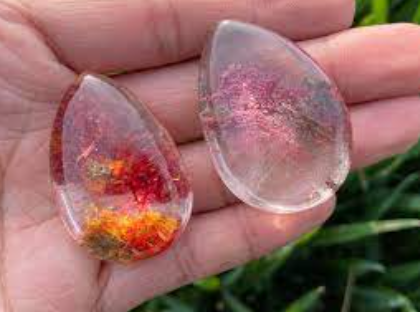As a child, did you ever gaze upon a snow globe, enchanted by the tiny, encapsulated world within? Imagine if you could carry around a small piece of nature’s own splendor, safely preserved for you to marvel at any time. In the realm of gemstones, garden quartz provides just that—a miniaturized snapshot of the beautiful outdoors, enclosed within a crystal.
1. The Charm of Garden Quartz
Garden quartz, also known as scenic quartz or landscape quartz, is a form of quartz that captures Mother Nature’s artistry in a crystal. Inside this clear to milky quartz, you’ll find inclusions of other minerals, which form patterns resembling enchanting landscapes, gardens, or even underwater scenes. It’s like holding a piece of the great outdoors in the palm of your hand.
Table of Contents
2. Understanding Quartz: The Parent Mineral
Quartz is one of the most common minerals on Earth, found nearly everywhere in the earth’s crust. The key to its widespread presence is its chemical simplicity. It’s composed of silicon dioxide, a compound abundant in our planet’s makeup. The versatility of quartz, in terms of its colors and forms, makes it a treasure trove for gemstone enthusiasts.
3. Formation of Garden Quartz
Garden quartz is formed when quartz crystals grow over other minerals and substances, trapping them inside. These trapped inclusions, over thousands of years, take shapes that resemble scenic landscapes, hence the name garden or scenic quartz. It’s truly a testament to nature’s slow yet artistic touch.
4. Where is Garden Quartz Found?
This beautiful stone can be found all over the world. However, some of the best-known sources are Brazil, Madagascar, and China. Each location contributes its unique touch to the stone, reflected in the inclusions and their formations.
5. Types of Garden Quartz
Depending on the type of inclusions, garden quartz can be classified into several types, such as chlorite quartz (green inclusions), rutile quartz (golden hair-like inclusions), or tourmalinated quartz (black needle-like inclusions), among others.
6. The Color Palette of Garden Quartz
The color of garden quartz depends on the inclusions it has. It can showcase a multitude of hues—green, red, brown, yellow, and more—providing a rich palette that adds to its appeal.
7. Uses of Garden Quartz
Garden quartz is often used in jewelry, where its scenic inclusions can be showcased and admired. It’s also popular among crystal healers for its reputed spiritual properties.
8. Spiritual Significance of Garden Quartz
Many believe garden quartz holds a deep spiritual connection with Earth, aiding in grounding and providing clarity. Its varied inclusions are thought to encompass different healing properties, making it a cherished tool for energy workers.
9. Care and Maintenance of Garden Quartz
Garden quartz is relatively hard and durable. However, it should be protected from sharp blows and sudden temperature changes. Cleaning can be done with mild soap and a soft cloth.
10. How to Identify Authentic Garden Quartz
Authentic garden quartz is transparent to semi-transparent, with noticeable inclusions forming patterns. It has a hardness of 7 on the Mohs scale, and it does not have any cleavage. It’s always good to purchase from a reputable source to ensure authenticity.
Wrapping up our journey into the enchanting world of garden quartz, it’s clear that this stone is much more than just a pretty gem. It encapsulates Mother Nature’s artistry and adds a layer of spiritual significance, making it a must-have for nature lovers and gemstone enthusiasts alike.
Frequently Asked Questions
1. Is garden quartz expensive?
The cost of garden quartz can vary widely based on the size, quality, and uniqueness of the inclusions. However, it is generally affordable compared to other gemstones.
2. What types of jewelry feature garden quartz?
Garden quartz can be found in all kinds of jewelry, including necklaces, rings, earrings, and bracelets.
3. Can I use garden quartz as part of my home decor?
Absolutely! Garden quartz makes for a unique and beautiful decorative piece. It can be used as a centerpiece or a conversation starter in your home.
4. Does garden quartz need any special care?
While garden quartz is relatively hard, it should still be protected from sharp blows, harsh chemicals, and extreme temperatures. Regular cleaning with mild soap and a soft cloth will keep it shining.
5. How can I be sure I’m buying authentic garden quartz?
Always purchase from a reputable dealer. Authentic garden quartz should be transparent to semi-transparent with distinctive inclusions. When in doubt, consult with a gemologist.






